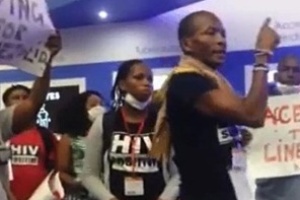Sanofi faces criticism at Lung Conference
TB activists at the 46th Union World Conference on Lung Health demanded that pharmaceutical company Sanofi be held accountable for failing to provide life-saving products to people and children living with TB and drug-resistant TB in South Africa and across the world.
CAPE TOWN, 4th DECEMBER 2015: Today, activists at the 46th Union World Conference on Lung Health demanded that pharmaceutical company Sanofi be held accountable for endangering failing to provide life-saving products to people and children living with TB and drug-resistant TB in South Africa and across the world. Activists from the Treatment Action Campaign (TAC), SECTION27, the Global TB Community Advisory Board (TB CAB), Treatment Action Group (TAG), the Global Coalition of TB Activists (GCTA) and the ITPC brought the exhibition room to a halt by picketing at Sanofi’s stand to highlight a catalogue of morally reprehensible behavior.
“We’re picketing today because we are fed up of Sanofi putting its bank balance ahead of the lives of our people. Medicines are a necessity, not a luxury. Sanofi’s research is crucial but is meaningless if it doesn’t help people in need,” said Blessi Kumar from the Global Coalition of TB Activists.
Shortages of the BCG vaccine
Earlier this year Sanofi stopped manufacturing the BCG vaccine because it was not generating enough profit through global sales. In stopping production, Sanofi caused a shortage of the vaccine felt in South Africa and across many other countries. BCG is used to prevent some TB infection in young children and is the only such vaccine available.
“Sanofi put thousands of children’s lives at risk by stopping production of the BCG with no warning. Where was the plan for ensuring a steady supply of production? Pharmaceutical companies have a responsibility to ensure access to the medicines and vaccines that people rely on to survive,” said Portia Serote from the TAC.
Charging unaffordable prices for linezolid
Linezolid is one of the only medicines available to treat XDR-TB. Many patients in South Africa and across the world would not be alive today had they not received it. Yet in South Africa, it remains out of reach for many people in desperate need. Due to the cost, doctors must make a strong case for use in the public sector and many patients aren’t approved. Instead, patients must pay the exorbitant private sector prices of R655/per tablet (USD $47) – or for those unable to pay, go without and likely die. Sanofi does not produce linezolid but rather only imports it from Hetero, an Indian manufacturer, and distributes it in South Africa with an exorbitant mark up. The global price for this product is about R76 per tablet (USD $5.35-5.48), but Sanofi is marketing it in South Africa at almost ten times that price, at R655 (USD $47).
“The cost of linezolid is unacceptably high. MSF procures the medicine for a fraction of the cost at R109/per tablet ($7.90) – yet Hetero and Sanofi continue to charge wildly high prices. It is the only hope for many patients and because of these high prices they are dying. The National Department of Health put out a tender to procure linezolid in the public sector but none was purchased, suggesting the companies set a price that was prohibitively high. We demand Sanofi and Hetero reduce the price of linezolid to allow access for all those in desperate need of it to survive,” said Anele Yawa, General Secretary of the TAC.
Clinical trials without medicine registration
Sanofi is too slow in registering new TB medicine, rifapentine, in South Africa. This is despite the fact that clinical trials of the medicine have been done in the country. Rifapentine is used in the United States as part of a new, much shorter regimen for TB prevention. It is deeply unethical to test a medicine or regimen in a population and not ensure access to that medication post trial. “Sanofi has been a leader in investing in researching new strategies to fight TB, but can do MUCH more to guarantee access. We know Sanofi are taking steps to make rifapentine available in other countries, but they must do so quickly and ensure affordability,” said Erica Lessem from the Treatment Action Group (TAG).
Click here to watch TB survivor and TAC member Andrew Mosane explain why activists are up in arms about high drug prices.
Source: Treatment Action Campaign


